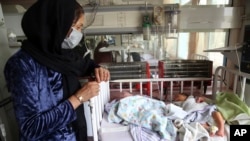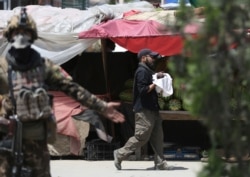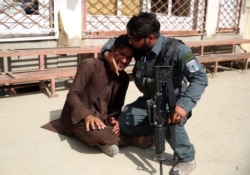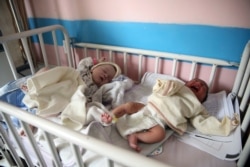“Because of the shock, my milk has dried up,” said Najiba, 35, an Afghan mother who narrowly escaped with her newborn son during last week’s maternity ward attack that has stunned Afghanistan.
The attack at Dasht-e-Barchi Hospital in Kabul by three shooters disguised as Afghan security forces has left more than 20 women and children dead and 16 others wounded.
Najiba, who like most Afghans goes by a single name, told VOA the maternity ward was the last place Afghans thought would become the scene of the country’s latest wave of militant violence.
“They entered, and everyone said that they were suicide attackers,” she said. “They all entered and started shooting. It was horrific. The windows were shattered. Everyone was running, and I was able to get out with my baby.”
Still in trauma, Najiba said she is grateful and amazed that she and her infant son were not shot as bullets reverberated through the ward.
“Thank God, my child is now doing well,” she said. “We have to buy powdered milk from the bazaar.”
The Taliban denied any involvement in the attack. The United States blames Islamic State. IS has not responded to the U.S.’s accusation, but the terror group did claim responsibility for a suicide attack at a funeral in eastern Nangarhar province that occurred the same day. Thirty-two people were killed.
Atiqulllah Qaati, head of Dasht-e-Barchi Hospital, told VOA that at least two newborns were killed. He said the babies who survived were first sent to nearby medical facilities before being returned to their mothers. Those who lost their mothers in the attack will be placed in the custody of relatives.
“Among the 19 newborns, 13 of them were returned to their families. Two of them were returned to their mothers. These two mothers were evacuated by the Afghan special forces during the operation. Six babies are still in the hospital,” Qaati said.
The hospital chief said he was in a meeting around 10 a.m. when he received word about the attack in a phone call.
“I could hear shooting on the phone,” he said, adding that the barrage of bullets left the hospital in ruins.
“The doors and windows are broken, and the walls are damaged. The building cannot be used until repaired. The president visited the hospital and promised to repair it as soon as possible,” Qaati said.
Dasht-e-Barchi is a 100-bed facility. Its 55-bed maternity ward was opened in 2014 by Médecins Sans Frontières (Doctors Without Borders). According to MSF, 5,401 babies have been delivered so far this year.
IIn a statement issued after the attack, MSF said it was devastated by “this senseless act of cowardly violence.” It said the maternity unit has suspended its activities but has not closed.
According to Qaati, the number of casualties could have been much higher had it not been for the emergency exits, the MSF-installed alarm system and measures taken to contain the coronavirus pandemic. He said patients were separated, and the medical staff worked in shifts as a part of social distancing practices.
“I am in complete shock,” Qaati said. “How they can attack a hospital — a hospital run by MSF, an organization that always keeps its neutrality?”
Wide reactions
Just hours after the attack, outraged Afghan officials publicly accused the Taliban, despite the group’s denial.
Afghan President Ashraf Ghani in a televised address ordered security forces to go from a defensive position to an offensive one. The country’s forces have been on “active defensive” mode since February when the Taliban committed to a weeklong reduction in violence.
Ghani said the security forces needed to resume operations "to defend the country, safeguard our countrymen and infrastructure, and to repel attacks and threats by the Taliban and all other terrorist groups."
International organizations have strongly condemned the attack, including Human Rights Watch and Amnesty International, who demanded the perpetrators be brought to justice for a “war crime.”
Deborah Lyons, the U.N. mission head in Afghanistan, denounced the attack on Twitter.
“Who attacks newborn babies and new mothers?” she asked. “Who does this? The most innocent of innocents, a baby! Why?”
U.S. officials, who are concerned the attack could undermine Afghanistan’s tenuous peace process, asked the Afghan government and the Taliban to remain committed to a peaceful resolution.
“There are forces such as ISIS that (do not) see peace in Afghanistan in its interest and are trying to increase violence to undermine the prospects for peace,” U.S. Special Representative Zalmay Khalilzad told reporters in a press conference last week, using an acronym for Islamic State.
“We are urging both sides not to fall into that trap but indeed, to cooperate against terrorists, including ISIS,” he said.
Some Afghanistan observers say the attack is a serious development in violence that has been surging in the country since the U.S.-Taliban agreement in late February. The attack, they warn, could lead to a sectarian divide that IS can capitalize on.
“I think it is important to investigate and find out, if possible, who in fact the perpetrator was,” said Scott Warden, director of Afghanistan and Central Asia programs at the U.S. Institute of Peace (USIP).
Warden said the nature and location of the incident “fits the pattern of ISIS attacks.”
The Dasht-e-Barchi hospital is located in western Kabul in a neighborhood that is predominately Hazara. For decades, the Shiite community has found itself targeted by Sunni extremists. While the Taliban has lately refrained from anti-Shiite rhetoric, IS continues to consider the minority’s faith a deviation from Islam.
According to Colin Clarke, a senior fellow at the Soufan Center, the attack puts more pressure on the Afghan government by increasing its security measures, while at the same time, attempting to advance peace talks with armed militants.
He said these types of attacks aim “to show that the Afghan government and security forces are unable to protect the population.”







